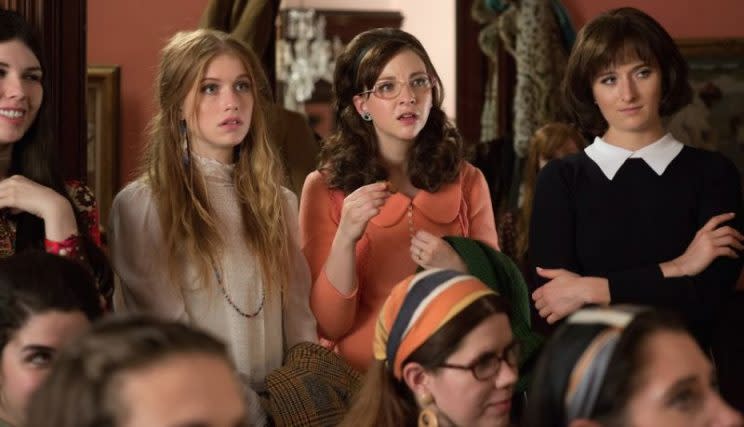‘Good Girls Revolt’ Doesn’t Do Feminism Any Favors

Good Girls Revolt, which begins streaming Friday on Amazon Prime, is a textbook example of how not to adapt an excellent book for television. Revolt takes Lynn Povich’s fascinating 2012 book of the same name — subtitle: “How the Women of Newsweek Sued Their Bosses and Changed the Workplace” — and turns it into a sub-Mad Men piece, filled with trite characters and anachronistic dialogue.
The show, developed by Dana Calvo, uses Povich’s nonfiction history of a 1970 antidiscrimination lawsuit brought by women working at Newsweek and invents a fictionalized mag — News of the Week. The first episode has a lot of scene-setting for viewers unfamiliar with that era of media-making. Good Girls Revolt tells you that women weren’t allowed to be reporters at newsmagazines — they were hired as researchers, to do the legwork for male reporters who wrote up the research and got the bylines that secured them bigger salaries and reputations than the women. It was against this system, and amid the late-1960s backdrop of the counterculture and Betty Friedan-era feminism, that Good Girls Revolt is set.
GGR centers around Genevieve Angelson’s Patti, the researcher who’s the ringleader of the revolt; Anna Camp’s Jane, a reluctant participant with conservative instincts; and Erin Darke’s Cindy, an introverted young woman (a mouseburger, in Cosmopolitan editor Helen Gurley Brown’s famous phrase of that era) in whom feminism will awaken her soul. The show mixes fictional characters with a few real ones: Grace Gummer, for example, appears here and there as a young Nora Ephron, who blows through the News of the Week offices just long enough to quit and then land a job at the New York Post, where she launches her storied career as a journalist and, beyond that, a filmmaker.
The women are shown serving the men, foremost among them managing editor Finn Woodhouse, played by Chris Diamantopoulos, and his second in command, Wick McFadden, played by Jim Belushi. (Patti has a thing for a young reporter, Doug, played by Weeds’ Hunter Parrish.) Finn is a pure Don Draper knockoff, strutting his naughty-boy male privilege in a manner that’s all too clearly a setup for a Lesson to Be Learned.
Much of the time, GGR plays like a bad History Channel docudrama about the late ’60s, as characters shake their heads sorrowfully over the bad vibes of Altamont (the Rolling Stones concert turned murderous), debate the morality of the Vietnam War and dig a groovy new band “called Black Sabbath … I think they’re pretty bitchin,’” says a (male) art director. “These guys are onto something new, but also ancient, druidic!”
The young actors do their best, but they’re too locked into their assigned character traits to emerge as fully fleshed-out people. And I do mean “young”: Most of the male editors discussed in Povich’s book were probably in their mid-40s or older; in the TV version of GGR, all the dudes except for Finn and Wick seem to be 20-somethings. This is just pandering to get a younger audience to watch.
The dialogue is laughable, both in its melodramatic overstatement and its historical inaccuracy. Sorry, GGR, but in the late 1960s, no one was talking about “safe spaces,” the word “newbie” hadn’t been coined and no one would have said he wanted News of the Week to be the public’s “go-to” magazine for “kicking butt.”
In real life, 46 women of Newsweek engaged attorney Eleanor Holmes Norton to bring a lawsuit charging discrimination in hiring and promotion. (In the show, she’s played by Parenthood’s Joy Bryant.) I urge you to read Povich’s book, which does a great job of summarizing the women’s point of view — she was among the Newsweek 46, and perhaps the basis for the Patti character — and summons up that era of publishing more vividly than all of GGR’s paisley blouses and sexist-pig men preying upon innocent girls ever could. The book gives the women their dignity; the TV show turns them into cartoons.
Good Girls Revolt is streaming now on Amazon Prime.


